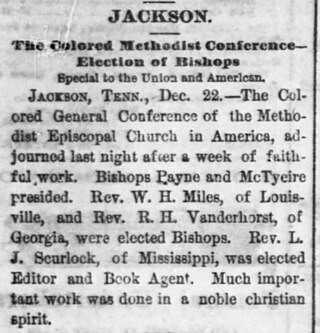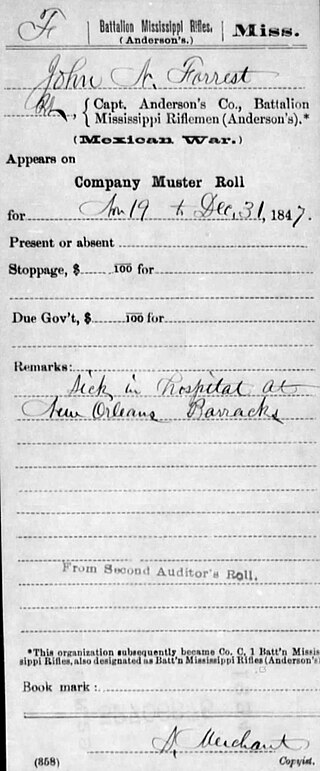
Memphis is a city in the U.S. state of Tennessee. It is the seat of Shelby County, in the southwesternmost part of the state, and is situated along the Mississippi River. With a population of 633,104 at the 2020 U.S. census, Memphis is the second-most populous city in Tennessee after Nashville.

Shelby County is the westernmost county in the U.S. state of Tennessee. As of the 2020 census, the population was 929,744. It is the largest of the state's 95 counties, both in terms of population and geographic area. Its county seat is Memphis, a port on the Mississippi River and the second most populous city in Tennessee. The county was named for Governor Isaac Shelby (1750–1826) of Kentucky. It is one of only two remaining counties in Tennessee with a majority African American population, along with Haywood County.

Yalobusha County is a county located in the U.S. state of Mississippi. As of the 2020 census, the population was 12,481. It has two county seats, Water Valley and Coffeeville.

Lafayette County is a county in the U.S. state of Mississippi. At the 2020 census, the population was 55,813. Its county seat is Oxford. The local pronunciation of the name is "la-FAY-et." The county's name honors Marquis de Lafayette, a French military hero and American general who fought during the American Revolutionary War.

Grenada County is a county located in the U.S. state of Mississippi. As of the 2020 Census, the population was 21,629. Its county seat is Grenada. The county was named for the province of Granada in southern Spain but spelled inaccurately. Its western half is part of the Mississippi Delta. Cotton cultivation was important to its economy well into the 20th century.

Grenada is a city in Grenada County, Mississippi, United States. The population was 13,092 at the 2010 census. It is the county seat of Grenada County.

Duck Hill is a town in Montgomery County, Mississippi, United States. The population was 619 at the 2020 census, down from 732 in 2010.

Atoka is a local government area with a town charter in Tipton County, Tennessee, United States. In 1888, Atoka was a stop on the Newport News & Mississippi Valley Railroad. Today the City of New Orleans Amtrak passenger train makes its daily route between New Orleans and Chicago, through Atoka. The population was 10,008 at the 2020 census, making the Town of Atoka the largest municipality in Tipton County.

Christian Brothers University is a private Roman Catholic university in Memphis, Tennessee. It was founded in 1871 by the De La Salle Christian Brothers, a Catholic teaching order.

Mercer University is a private research university with its main campus in Macon, Georgia. Founded in 1833 as Mercer Institute and gaining university status in 1837, it is the oldest private university in the state and enrolls more than 9,000 students in 12 colleges and schools. Mercer is a member of the Georgia Research Alliance. It is classified as a "R2: Doctoral Universities — High research activity".

James Robinson Graves was an American Baptist preacher, publisher, evangelist, debater, author, and editor. He is most noted as the original founder of what is now the Southwestern family of companies. Graves was born in Chester, Vermont, the son of Z. C. Graves, and died in Memphis, Tennessee. His remains are interred in Elmwood Cemetery in Memphis.

Mississippi Highway 7 runs generally north–south from the Tennessee state line in Benton County to Belzoni, Mississippi. It travels approximately 168 miles (270 km), serving Humphreys, Leflore, Carroll, Grenada, Yalobusha, Lafayette, Marshall, and Benton counties while serving several points of interest, including Florewood River Plantation State Park, the University of Mississippi, and Wall Doxey State Park. MS 7 runs nearly parallel to the rarely used Mississippi Central Railroad.

The Skuna River is a tributary of the Yalobusha River, about 75 mi (120 km) long, in north-central Mississippi in the United States. Via the Yalobusha and Yazoo Rivers, it is part of the watershed of the Mississippi River.
The following is a timeline of women's colleges in the United States. These are institutions of higher education in the United States whose student population comprises exclusively, or almost exclusively, women. They are often liberal arts colleges. There are approximately 35 active women's colleges in the U.S. as of 2021.
Virginia E. Broughton was an African American author and Baptist missionary. One of four students in the first class at Fisk College in 1867, she later became a recognized religious scholar, writing articles for National Baptist Union and National Baptist Magazine. As a prominent member of the Baptist church and National Corresponding Secretary of the National Baptist Convention, she worked to ensure that the interests of African American religious women were addressed by the governing body of the Baptist denomination. Broughton was licensed as a missionary and subsequently commissioned to the mission field.
The following is a timeline of the history of the city of Memphis, Tennessee, US.

John Scurlock, known as Little John Scurlock or L. J. Scurlock, was a Methodist minister, editor and politician in Mississippi, United States. He was reported to be seven feet tall. According to a history written during the nadir of American race relations era, "The negro leader, John Scurlock, was killed one night in Coffeeville by unknown parties. It was supposed that the deed was committed by the Ku Klux Klan, and little effort was made to find the murderers, as the negro was a very bad character." However although he is often classified as a Reconstruction-era murder victim, records of the Methodist Church in the south seem to have Rev. L. J. Scurlock into the 1880s or possibly 1890s. A history published 1895 states "Many who have been in attendance upon the sessions of the General Conference in recent years will remember the tall, courtly figure of a presiding elder from Mississippi, the Rev. L. J. Scurlock. A prominent worker on committees, thoughtful and dignified, he gained immediate attention whenever he obtained the floor in debate. For many years he occupied a leading position among the people of his own State, and in the Conference he exercised a commanding, yet gentle, influence. He has passed from the ranks of the Church militant to his place in the Church triumphant."

John N. Forrest was one of the six Forrest brothers who engaged in the interregional slave trade in the United States prior to the American Civil War. A disabled veteran of the Mexican–American War, he worked in family businesses, including as the jailor at Nathan Bedford Forrest's slave pen in downtown Memphis.
The Grenada, Mississippi tornado of May 7, 1846 killed 21 people, injured 60, and destroyed 60 or 70 buildings in the southern half of Grenada, Yalobusha County, Mississippi in the United States. Another account had it that 112 buildings were destroyed. Property damage was estimated at $65,000 to US$80,000. According to the New Orleans Picayune, "On the outside of a letter to a friend, is written the words, 'Grenada is in ruins, and many of her inhabitants are destroyed; names cannot be given, or numbers set down."
















